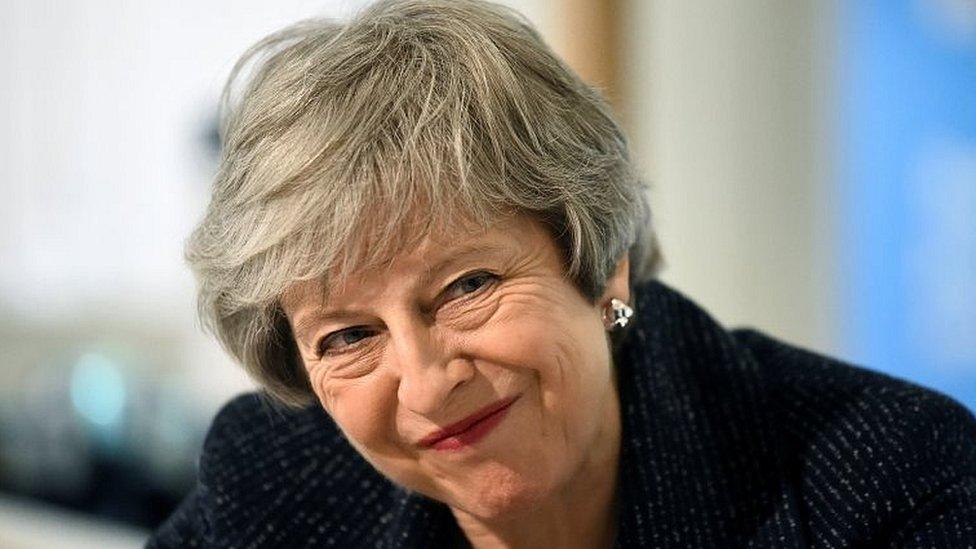Brexit: Will May make 'good enough' progress?
- Published

Theresa May at a community centre in Belfast on Tuesday evening
"It's not good enough to come back next week and say that the negotiations are ongoing," a senior Cabinet minister warned. But will the prime minister's travels this week do more than just keep the show on the road?
Today she's in Northern Ireland meeting the different political parties, including the DUP - whose votes she needs in Parliament - who are totally opposed to the current version of the controversial backstop, as well as Sinn Fein, who are just as adamant that it must remain.
Then on Thursday, Theresa May will be in Brussels, asking - again - for the EU to amend the policy, seeking either a time limit or a legal upgrade to the promise that both sides will only use it if they really, really, really have to, and they don't expect it to last forever.
In short, today's a chance for the PM to test out what she'll ask for, tomorrow, an opportunity to sell it as hard as she can in Brussels.
Remember, she has asked for these changes before and been turned down.
And she's heard before from both sides in Northern Ireland how dug in their positions are.
So can she do anything other than take one more turn around the same carousel while the clock ticks down?
The difference on her travels this time is that it's not just the prime minister pleading with the EU to budge, warning that this deal hypothetically might not wash.
It's the first time she'll meet the EU top brass since the plan that she agreed with them was thumpingly rejected by Parliament. And the first time too she has some evidence to show that the deal could, in theory, pass through the Commons if the backstop was eventually changed.
That's what last week's drama was all about - the so-called Brady amendment (which already feels a lifetime ago) passing Parliament paved the way for the prime minister to have another go at getting changes because it allows her to say to the EU, "look, all those grumpy MPs could come on board, if only you are willing to give me this one thing - I know that you have said no in multiple languages, but it is the only way this is going to work".
That's why today will also be important for the Irish leader, who has his own talks in Brussels.
Until now, Leo Varadkar has staked his political reputation on sticking to the backstop. Don't hold your breath for any signs of concessions from him later.
One source said they wouldn't be likely to move until the "92nd minute". But with the risk of no-deal looming larger, by simple virtue of time marching on, perhaps behind closed doors the EU's dealmakers are looking for ways out.
That's why this week, for example, Martin Selymayr did discuss with MPs whether they could accept a souped-up legal version of promises that have already been made.
That's not the same as putting it on the table as an official proposal of course. But the fact that such a conversation has taken place matters.
A tweaked deal?
It seems rather optimistic though that, by the end of tomorrow, the prime minister will have conclusive proof that those kinds of noises-off make a concrete deal, or that the legal fixes being proposed by the Attorney General at home have been convincingly signed off by the EU.
And all the while a group of Remainers and Brexiteers are working with government officials on their hoped-for alternative, the so-called Malthouse Compromise.
While a tweaked deal with the EU could get some reluctant Brexiteers on board, some are hardening around the idea that it has to be this plan now, or there won't be a plan they can back at all.
One key member of the powerful ERG group of Tory Brexiteer MPs told me this is "the only show in town", claiming that if No 10 doesn't ultimately buy their plan - which you can read about here - then the government could fall.
That's quite a threat to wave around.
No 10 is trying to maintain the idea that this could be the route they follow. The simple truth is they need the votes of those MPs who back it.
But it's clear in the first instance that No 10 is trying to change the backstop in the deal they have sweated over for two years, rather than make a more significant shift.
What Theresa May might need from the next 48 hours though is proof that the EU could move in her direction.
Evidence to present back to Parliament next week that, while there might not be a deal fresh with wet ink, there is at least a proposal that's being taken seriously, that paves the way for another vote on a government-friendly amendment that can be used to signify numbers moving in her direction.
If she comes back with nothing at all to show, nor any encouragement for those strongly pushing for change, then in her colleague's words, it might "not be good enough" at all.